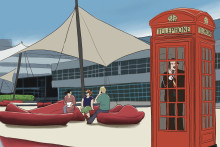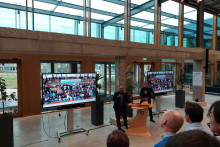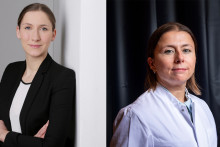Chairman of the board Victor van der Chijs calls the policy 'a logical continuation of the internationalization vision of 2015.' He does not expect much debate to arise on campus. 'The UT was one of the first Dutch universities to switch to English. As a result, English has been our way of working for a while. We do this because we are an international university, where inclusiveness is of paramount importance. A technical university is by definition largely English. This policy document is a translation of it.’
'Internationalization no longer an issue'
According to the language policy, all formal communication (including official documents) becomes English. Meetings are in principle in English, Dutch is allowed if everyone has a good command of the language. Messages on the employee portal are primarily in English and can also be done in Dutch when required. All master's programs are already in English and the last bachelor's programs are in the transition phase. Van der Chijs: 'I expect that internationalization will no longer be an issue in three years' time. Then we are a complete international university where English is the common language.’
The rise of the English language in Dutch higher education also receives criticism, for example in national politics. These concerns can be traced back to the Higher Education and Scientific Research Act (WHW). It states that universities should focus on helping Dutch students to ‘promote their expression in Dutch'. And the Royal Netherlands Academy of Arts and Sciences (KNAW) advises to keep paying attention to Dutch language skills.
The UT chooses to do that in the form of extracurricular activities. 'The study programs indicate that the curriculum is already full enough,' says Van der Chijs. ‘We do not want to add another learning objective to that. However, I can imagine that students want to learn to write well in Dutch. We will make an inventory of whether this need is indeed there and discuss it with the TCP Language Center. This also applies to the range of Dutch courses for international staff.’
Van der Chijs takes notice of the political discussion about English language. ‘It just does not apply to technical universities. We are by definition English-speaking, because we are operating in an international playing field. It’s not about the curriculum, but about the UT community, where everyone should feel welcome. That is why all job interviews, including support staff, will be partly conducted in English.’
From bad English to top 5 nationwide
Then there is the criticism of the English level of the teachers, as recently stated in the Keuzegids. UT students gave their teachers an average score of 6.3 for English. This puts the UT in a shared last place. ‘I am convinced that the level of English is not so bad,’ says Van der Chijs. ‘But we take this signal seriously. That is why we state an ambition. In 2020 we will be in the top 5, nationwide.’
According to Hetty Bennink (policy advisor International Affairs), the university will gradually achieve this goal. 'Because of our language policy, we expect more inflow of international staff. If you work in an international environment, this has a positive effect on your language skills. In addition, we increase our range of courses and make them more tailor-made. We now see that staff members are not very motivated to take a course because they already have the required C1 level. Therefore, for teachers, we think of an English course focused purely on the lecture room.'
Teachers who do not achieve the C1 level are not allowed to teach, according to the document. At the moment this is 1.3 percent of the teaching population, while 14.4 percent has not yet been tested. 'But I do not assume that will happen,' says Van der Chijs. 'If you do not achieve the C1 level, you can retry. We offer support to succeed.’
According to the chairman of the board, the transition to English is especially not meant to exclude people. 'You really are not sidelined if you do not pass a test. In fact, we think about rewarding people when they invest in themselves. And we encourage exchange, both for academic staff and support staff. Spending a few weeks with an international partner university is the best course you can take.’







